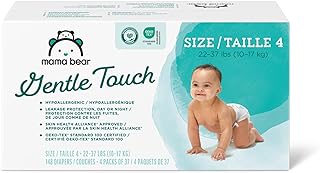5 important factors worth considering when looking for the best diapers
Choosing the right diapers for your baby can be a tough decision because there are so many options to pick from. You have to think about how well they absorb, how they fit, the impact on the environment, and if they are cost-effective. Some people focus on convenience and comfort, while others care more about being eco-friendly and gentle on their baby’s skin. In this article, we will discuss the important things to think about when choosing diapers that meet both your baby’s needs and your values.
See our guide to the best diapers.
Absorbency
When you’re choosing diapers for your baby, it’s important to consider how well they absorb moisture. This is crucial for keeping your baby comfortable and preventing leaks. Diapers with advanced absorbent technology keep your baby dry and allow them to move around freely without any discomfort.
High-absorbency diapers are a great investment for both you and your baby. They make life easier with fewer diaper changes and superior moisture absorption. These diapers keep your baby’s skin dry, healthy, and free from rashes. By choosing diapers with good absorbency, you’ll have a happier baby and a smoother day for both of you.
Fit/size
When buying diapers for your child, it’s important to make sure they fit properly. A snug diaper not only keeps your baby happy but also helps prevent leaks and accidents. Since every baby is different, what works for one may not work for another. Knowing your baby’s weight and shape can help you choose the right size diaper. A good fit can also reduce the risk of skin irritation and rashes, making diaper changes more comfortable for both you and your baby.
Taking the time to find the right diaper size can make your daily routine easier. A well-fitting diaper allows your baby to move freely and explore without any discomfort. It also helps them sleep better at night by keeping them dry and cozy. Remember that as your baby grows, their diaper size may change, so it’s important to pay attention to their needs. By prioritizing fit and size when choosing diapers, you show your dedication to your baby’s well-being and comfort, creating a caring environment for their healthy development.
Material
When buying diapers, the type of material is important but often forgotten by consumers. Choosing diapers made from organic materials like bamboo or cotton can be good for your baby and the environment. These natural fabrics are soft on babies’ skin, reducing the chance of rashes. Also, using eco-friendly diaper materials helps reduce the environmental impact of disposable diapers, which can take hundreds of years to break down in landfills. By picking diapers made from sustainable and soft fabrics, you’re not only putting your baby’s comfort first but also helping the planet.
In contrast, synthetic materials like polyester and polypropylene, often found in regular diapers, may have chemicals that can cause allergic reactions in babies. These synthetic fabrics also may not allow for good airflow, which can lead to discomfort and skin problems for your baby. While cost and convenience are important factors when buying diapers, it’s crucial to think about the long-term effects of the materials used. Buying diapers made from natural and organic materials might cost more upfront, but the benefits of comfort, breathability, and eco-friendliness are worth it. Ultimately, choosing the right diaper material can make a big difference in your baby’s health and the environment.
Cost
When buying diapers, price is an important factor to consider. The cost of diapers can vary based on the brand, quality, and quantity. While parents always want the best for their babies, expenses can add up quickly. It’s important to find a balance between affordability and quality when choosing diapers for your child. Cheaper options may seem budget-friendly at first, but they can cause discomfort for your baby and require more frequent changes, ultimately costing more.
Investing in slightly more expensive, high-quality diapers can be a smart choice in the long run. These diapers often have better absorption, less leakage, and provide more comfort for babies. This can lead to fewer diaper changes and potentially lower overall expenses over time. It’s important to prioritize your baby’s well-being and comfort while being mindful of costs when choosing from the many diaper options available. Finding the right balance between cost and quality is crucial for a positive experience for both the baby and parents.
Hypoallergenic
With increasing awareness about protecting the environment and keeping babies’ skin safe, many parents are choosing hypoallergenic diapers. These diapers are popular because they reduce the chance of exposing babies to irritating substances like fragrances, lotions, and harsh chemicals. People who care about their baby’s comfort and health find hypoallergenic diapers appealing.
Hypoallergenic diapers not only help with existing allergies but also prevent future skin sensitivities by shielding babies’ delicate skin from potential irritants. In a market full of diaper options, the focus on hypoallergenic features shows that parents’ needs are changing. By using hypoallergenic diapers, caregivers can create a gentle environment for their babies, keeping their skin healthy and reducing the risk of discomfort or allergic reactions.
As more parents look for hypoallergenic products, manufacturers are using safer and gentler ingredients. This shift towards eco-friendly baby care products is good for the environment and promotes sustainable practices.
Conclusion
The use of diapers in parenting today sparks debates about convenience, environmental impact, and cost. Disposable diapers are easy but cloth diapers are eco-friendly. The choice between the two depends on personal values and situations, highlighting the importance of making informed decisions in the complex world of parenting. Want more info on wrist support for mouse bean bag, check the best wrist support for mouse bean bag.
